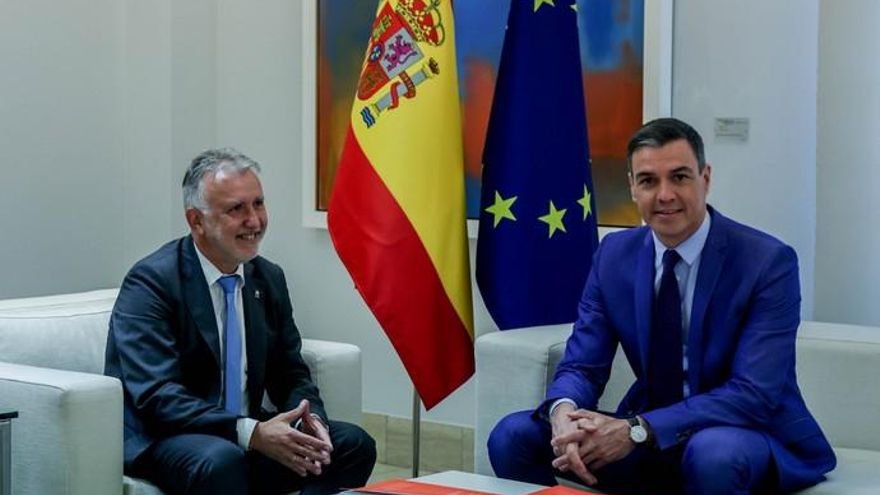
The Canary Islands will be one of the venues for the meetings and events that will be held on the occasion of the Spanish presidency of the European Union (EU) in the second half of 2023. Specifically The Gran Canarian palms It is one of the 25 cities throughout the country proposed by the State, which has caused the anger of the Mayor of the City Council of Santa Cruz de Tenerife, José Manuel Bermúdez, for staying out and recalled that the Canary Islands have two official capitals, so Santa Cruz has as much right as the capital of Gran Canaria to host this type of meeting. Both from the regional government and from the Capital City Council they assure that the decision to choose the city as the Canarian seat of the community presidency has been exclusively of the State.
The organizing committee of the Spanish presidency of the EU has proposed 25 cities from all the autonomous communities, which represents “an important milestone” in the preparation work with the objective, according to Moncloa, «to bring Europe closer to all citizens and make the richness and diversity of our country visible to Europe and the world». The autonomous communities have been convened at the end of the month in the Basque Country to deal with the preparations that the chosen cities will have to carry out.
Sources from the regional Executive point out that the Autonomous Community had transferred the interest in having some of the activities that will be carried out during the Spanish semester at the head of the EU, in order to enhance the role of the Islands as an outermost region together with the rest of the RUP. But the choice of the capital of Gran Canaria has been a decision of the central government, according to the affected Canarian institutions, and which has been communicated directly to the Canarian Executive and the Capital City Council. The Government delegate in the Islands, Anselmo Pestana, highlighted yesterday that several summits of ministers of certain ranks will be held and the capital of Gran Canaria is one of the cities proposed for it. “The Canary Islands are a magnificent land of welcome and on certain issues we are interested in being present in the image that is given during the Spanish Presidency of the European Union,” he added.
The communities that have the most proposed cities are Andalusia with four –Cádiz, Seville, Córdoba and Granada– and two cities from Castilla-La Mancha –Toledo and Albacete–, Castilla y León –Valladolid and León–, Galicia –Santiago de Compostela and Vigo–, Basque Country –Bilbao and San Sebastián– and Catalonia –Barcelona and Tarragona–. Of the rest of the communities it is a city: Gijón, Las Palmas de Gran Canaria, Logroño, Murcia, Pamplona, Santander, Zaragoza, Cáceres, Madrid, Palma de Mallorca and Valencia.
The struggle between cities and islands for an appointment or international organization has also taken place in the proposal that the Canary Islands become the headquarters of the future European Tourism Agency. The councils of Gran Canaria, Tenerife and Fuerteventura and the City Council of the capital of Tenerife have already proposed, opening a dispute to which the Vice President of the Government referred yesterday, Roman Rodriguezin a parliamentary appearance. In his opinion, the Islands would do well not to “divide up” the seat of the European Tourism Agency before “conquering” this objective, and has called “not to be fighting among ourselves” eight years before the EU makes the decision.
The Canary Islands have the explicit support of the Spanish Government and other entities such as the CEOE employer association to host the new community body. Since it became known, a struggle has begun between the most touristic islands when there is not even a budget and structure for the new body, which aims to unify the EU’s tourism policy after the shock caused by the Covid crisis in the sector. In this sense, Román Rodríguez expressed that “we would do well not to divide this up before conquering it” because we will see how the location of the headquarters of the future European agency is resolved, and reiterated that it is not “very useful” to be “fighting between us” before the decision so, he joked, “equal support to those who do not propose.”
In this fury to host entities and events of national and international scope is also the proposal made by the scientific spheres and the Canarian universities for the Islands to host the new Spanish Space Agency, a body whose location will be decided next year and which will have a budget of some 4,500 million euros. In this case, the Archipelago bids with other communities that have also presented their proposals, such as Teruel, Seville or León. Among the milestones exhibited by the Canary Islands to welcome this new entity are the communications from the Maspalomas Space Station with the Apollo XI mission, by which man reached the moon in 1969; the launch of the Minisat-01 from a plane that took off from the Gando airport in 1997 and the various initiatives carried out by the European Space Agency (ESA) in Tenerife and Lanzarote to train future astronauts.
In the sports field, the option that Spain and Portugal can organize the 2030 World Cup has opened the possibility that one of the fields where World Cup matches are held is that of Gran Canaria and the Cabildo has already proposed it, which has had the support of the regional government, which has transferred it to the Spanish Football Federation. Next year it will be known which countries will organize the World Cup, where the southern cone of South America is also bidding.
















